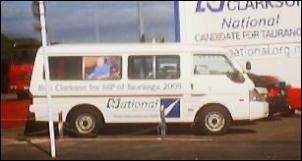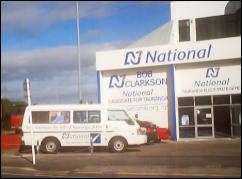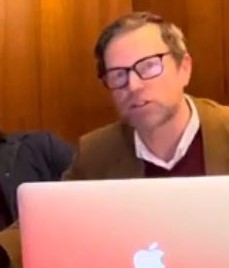Level Playing Field For Candidates
Disappears

"There may be a range of factors which enable a particular candidate to obtain goods or services at a lower price than another. These may include particular market conditions, the existence of other commercial relationships with the supplier, the extent of the supply, the ability to obtain bulk discounts and other factors." Justices Randerson, Goddard and Panckhurst's reasoning as to why National's Tauranga candidate Bob Clarkson was able to achieve incredibly good deals for his campaign advertising.
The level playing field regarding electorate candidates' campaign spending no longer exists according to Auckland University political scientist Raymond Miller.
"If you are a businessperson that has good dealings with advertising agencies, or polling agencies, then you have a massive advantage," Dr Raymond Miller told Scoop after he had studied parts of the Peters Vs Clarkson judgment that related to market rates and election expenses.
Mr Peters, had lodged a petition in the High Court alleging Mr Clarkson breached electoral law by knowingly spending more than the $20,000 limit during the election campaign.
However, last week Justices Randerson, Goddard and Panckhurst concluded that Mr Clarkson's campaign cost $18.159.79. This figure is more than Mr Clarkson's estimate of his expenses which was around $10,000, but safely under the $20,000 mark that is allowed by the Electoral Act


Dr Miller was particularly surprised by the section of the judgment that related to signwriting work carried out on the current MP for Tauranga Bob Clarkson's van. In Dr Miller's opinion the judges had shown no particular eagerness to investigate this particular topic.
"One would have thought that it would have been relatively easy to work out what was a realistic price [for signwriting or publishing] but clearly the court didn't want to go down that particular track," he said.
While Winston Peter's campaign manager John Foote did provide the High Court with quotes for work he considered was similar – both of which were for sums in excess of $1000 – Justices Randerson, Goddard and Panckhurst were happy that the figure supplied by Mr Clarkson's team of $119 (inclusive of GST) was the reasonable 'market value' for Mr Clarkson's signwriting.
After obtaining a photo of Mr Clarkson's van Scoop asked a number of signwriters what they considered was a reasonable price for the work that was carried out by Tony Hill Signs for Mr Clarkson.
The cheapest quote Scoop could find for similar work was from a Wellington signwriter who stated:
"We would charge between $600 - $750 + GST for a double sided van job like this, depending on what type of vinyl used."
The same business that provided Scoop with the lowest quote also informed us that they "would go out of business" if they charged $119 (incl. GST) for a similar job because this price would not even "cover the cost of the materials."
Another quote for materials alone from a member of the New Zealand Sign and Displays Association put the ink, vinyl and other signwriting materials at well above $500. This master signwriter considered it unlikely Mr Clarkson could have been able to get even one window of his van signwritten for the sum of $119 (incl.GST).
Scoop contacted Tony Hill Signs to discover just how they were able to charge Mr Clarkson a price so low that other signwriters considered - if they charged in a similar fashion - would put them out of business.
When Scoop asked the owner (presumably Mr Hill) if it would be possible to get a job similar to Mr Clarkson's for $119 (incl. of GST) Mr Hill replied " I wouldn't have the foggiest because I can't see your car and I don't quote on cars without seeing them. End of conversation." Mr Hill then promptly hung up the phone.
Labour Party President Mike Williams was bemused by aspects of the decision, in particular those parts of the decision relating to signwriting and printing costs.
"[Labour] has always understood that items such as printing and signwriting were to be attributed at fair market rates – as opposed to mates rates."
"In this decision the court is making rules that we didn't understand them to be," he told Scoop yesterday.
National Party leader Don Brash was however pleased with the decision regarding his new MP. In a press release immediately following the confirmation that Bob Clarkson would continue to be the MP for Tauranga Dr Brash said that Mr Clarkson "campaigned with integrity. He won Tauranga fair and square."
Mr Clarkson himself put out a press release entitled 'Bob Clarkson delighted at result' the same day.
Mr Peter's campaign manager, John Foote, was distinctly displeased with the judges interpretation of electoral law. Mr Foote considered the Judges interpretation of spending rules "leaves the system wide open to excess."
In Mr Foote's opinion the decision regarding Mr Clarkson was "a low point in New Zealand's political history."
Via email Mr Foote sent Scoop this reflection on what the decision now means for politics in New Zealand.
"For every candidate to receive a fair-go, a teacher’s election dollars must purchase approximately the same amount of election adverting as the business executives’ dollar. That did not happen in Tauranga. Mr Clarkson received massively discounted prices for election materials and services—not due to his negotiating power as a candidate, rather because of his role as director of a business. A business, which is arguably a completely separate legal entity from Mr Clarkson the candidate."
Mr Foote wants the rules clarified before the next election. In this desire Mr Foote is not alone. Dr Raymond Miller told Scoop that there was "no question" that election campaign spending laws need to be looked at.
"It is now time to look at how the rules need to be tightened to ensure that there is fairness between candidates at election time," he said.
Further Highlights From the Peters Vs Clarkson Decision
Scoop understands after conversations with officials that bumper stickers are considered similar to signage (roadside electorate hoardings etc) by the Electoral Office. What this means is that even if the bumper stickers are plastered on cars before the three month period a part of the cost of the bumper stickers should be attributable to the candidate that purchased them.
However, according to the Judgment, Mr Clarkson's campaign manager Mr Wayne Walford's gave evidence that no bumper stickers were distributed prior to polling day and this part of Mr Peter's petition was abandoned.
Mr Clarkson seems to have got himself another excellent deal regarding where he gets his pamphlets published. Mr Peters team estimated that their printing costs were more than twice that of Mr Clarkson's. In keeping with Mr Clarkson's ability to get excellent signwriting deals Justices Anderson, Goddard and Panckhurst concluded that there may be a variety of valid commercial reasons for a price differential
"As earlier indicated, this could reflect ongoing commercial relationships in other matters[Scoop's emphasis], business competition, bulk buying and a range of other factors," reasoned the Judges.

Following the Peters vs Clarkson decision electorate candidates with bulging wallets would be well advised to buy or lease buildings in prominent positions during election campaigns.
The building containing Mr Clarkson's electorate office was leased from the city council by Mr Clarkson's company, Baypark Speedway Ltd, and Mr Clarkson sub-leased a part of it for his campaign office. Displayed prominently all over the building were signs relating to the election campaign. It was argued by Mr Clarkson's team that the use of the wall space was permitted by the lease.
Justice's Anderson,Goddard and Panckhurst concluded that there was no reason that any of this wall space should be counted as an election activity:
"If the right [to use the wall space] is available free of charge because, for example, the building is leased or owned by the candidate [Scoop's emphasis]or someone is willing to grant the right at no cost, the right so granted cannot be regarded as a material applied to an election activity."
ENDS



 Gordon Campbell: Gordon Campbell On Trump’s Tariff Wars
Gordon Campbell: Gordon Campbell On Trump’s Tariff Wars Richard S. Ehrlich: Israel, Hostages, Thailand & Jobs
Richard S. Ehrlich: Israel, Hostages, Thailand & Jobs Binoy Kampmark: Trump, Tariffs And Russia - A Very Muddled Policy
Binoy Kampmark: Trump, Tariffs And Russia - A Very Muddled Policy Gordon Campbell: DeepSeek, And China’s Inexorable Rise
Gordon Campbell: DeepSeek, And China’s Inexorable Rise Martin LeFevre - Meditations: History Is Not A Game
Martin LeFevre - Meditations: History Is Not A Game Peter Dunne: Dunne's Weekly - ACT Looks Backwards
Peter Dunne: Dunne's Weekly - ACT Looks Backwards